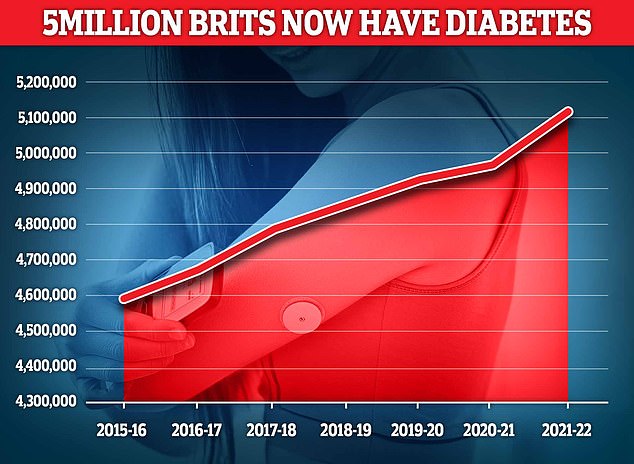By EMILY STEARN, SENIOR HEALTH REPORTER
Published: | Updated:
Eating just three portions of chips per week could trigger type 2 diabetes, say experts.
Scientists who tracked the diets of more than 200,000 adults found a 20 per cent higher risk among those tucking into three weekly servings.
Eating chips five times a week pushed this up to almost 30 per cent.
Yet, tucking into similar amounts of boiled, baked or mash potato had little impact on developing the condition, the study also revealed.
Potatoes have been vilified for decades over their calorie-dense high starch and low fibre content, putting people at increased risk of the condition.
However, experts today said the findings showed ‘how food is prepared’ is just as important to maintaining a healthy balanced diet.
Dr Faye Riley, research communications lead at Diabetes UK, who wasn’t involved in the study said: ‘This research shows that the link between potatoes and type 2 diabetes isn’t as clear-cut as it might seem.
‘Type 2 diabetes is a complex condition, with many factors influencing its development, including genetics, age and ethnicity.


She added: ‘Diet is just one part of the picture, but this study suggests that how food is prepared can make a difference and reinforces the advice to prioritise whole grains and cut back on fried or heavily processed foods as a way to support a balanced diet and reduce your risk.’
In the study, the team of international researchers including one from the University of Cambridge, tracked the eating habits of 205,000 health workers in the US.
Over a follow-up of almost four decades, 22,299 cases of type 2 diabetes were recorded.
After adjusting for lifestyle and dietary factors that could skew the results, the researchers found that three weekly servings of potato increased type 2 diabetes risk by just five per cent.
Only French fries—which are thinner than traditional chips but also higher in fat—consumed three times or more a week sent risk soaring.
The research also revealed that substituting baked, boiled, or mashed potatoes with whole grains lowered the rate by four per cent.
In a linked editorial, also published in The BMJ, the researchers said: ‘This finding also corresponds to the observed associations between high intake of ultra-processed foods and high risk of type 2 diabetes.
‘French fries are often ultra-processed, whereas baked, boiled, or mashed potatoes are often minimally processed.
‘With their relatively low environmental impact and their health impact, potatoes can be part of a healthy and sustainable diet, though whole grains should remain a priority.’
Type 2 diabetes occurs when the body doesn’t make enough the hormone insulin, which is needed to bring down blood sugar levels.
Genetics, lifestyle factors such as the amount of exercise a person does, diet and obesity all play a role in causing the condition.
Having high blood sugar levels over time can cause heart attacks and strokes, as well as problems with the eyes, kidneys and feet.
Sufferers may need to overhaul their diet, take daily medication and have regular check-ups.
Symptoms of the condition, which is diagnosed with a blood test, include excessive thirst, tiredness and needing to urinate more often. But many people have no signs.
Almost 4.3million people were living with diabetes in 2021/22, according to the latest figures for the UK, and numbers continue to climb.
Approximately 90 per cent of diabetes cases are type 2 diabetes, which is linked with obesity and is typically diagnosed in middle age, rather than type 1 diabetes, a genetic condition usually identified early in life.








